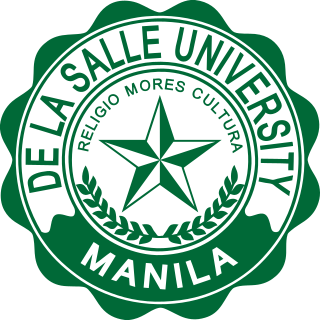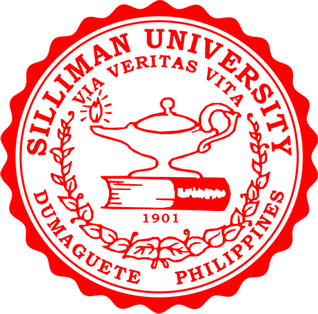
The University of the Philippines Diliman, also referred to as UP Diliman or simply University of the Philippines (UP), is a public, coeducational, research university located in Diliman, Quezon City, Philippines. It was established on February 12, 1949, as the flagship campus and seat of administration of the University of the Philippines System, the premier and national university of the Philippines.

De La Salle University, also referred to as DLSU, De La Salle or La Salle, is a private, Catholic coeducational research university run by the Institute of the Brothers of the Christian Schools in Taft Avenue, Malate, Manila, Philippines. It was established by the Christian Brothers in 1911 as De La Salle College (DLSC) in Nozaleda Street, Paco, Manila with Blimond Pierre Eilenbecker, FSC serving as director, and is the first De La Salle school in the Philippines. The college was granted university status on February 19, 1975, and is the oldest constituent of De La Salle Philippines (DLSP), a network of 16 educational institutions, established in 2006 replacing the De La Salle University System.

Silliman University is a private research university in Dumaguete, Philippines. Established in 1901 as Silliman Institute by the Presbyterian Board of Foreign Missions, it is the first American and Protestant founded institution of higher learning in the Philippines.

The University of the East, also known as UE, is a private university located in Manila, Philippines. Founded in 1946, business tycoon Lucio Tan acquired the university in 1990. UE was once labeled as the "largest university in Asia" when its enrollment in the past reached over 65,000 students.

Central Philippine University is a private research university located in Jaro, Iloilo City, Philippines. Established in 1905 through the benevolent grant of the American industrialist and philanthropist John D. Rockefeller as the Jaro Industrial School and Bible School under the supervision of the American Baptist Foreign Mission Society, it is the first Baptist and second-American founded university in the Philippines and Asia.

Mapúa University, also known simply as Mapúa or MU, is a private research-oriented non-sectarian university located in Metro Manila, Philippines. The university was founded in 1925 by the first registered Filipino architect, Tomás Mapúa, a graduate of Cornell University in New York, US. In 2000, the university was acquired by the Yuchengco Group of Companies.

Cagayan State University, established in 1978, is the largest state institution of higher learning in the Cagayan Valley Region of the Philippines.
Sir Hermenegildo B. Reyes, KGCR co-founded the University of the East, was a Boy Scouts of the Philippines Scouting notable, Filipino educator, lawyer, mechnical and electrical engineer. Reyes served on the World Scout Committee of the World Organization of the Scout Movement from 1961 to 1967.
Francisco Tarnate Dalupan Sr. was the Filipino founder and first chairman and the president of the University of the East (UE). He was the father of the legendary Filipino basketball coach Virgilio "Baby" Dalupan.
The Philippine College of Commerce and Business Administration (PCCBA) is the former name of the University of the East, Manila, Philippines. Established in 1946.
The Philippine Bar Examinations is the professional licensure examination for lawyers in the Philippines. The exam is exclusively administered by the Supreme Court of the Philippines through the Supreme Court Bar Examination Committee.

Alfonso Yuchengco was a Filipino accountant, industrialist, businessman, educator, and diplomat. He headed the Yuchengco Group of Companies, one of the largest family-owned business conglomerates in the Philippines. He also served as chairman of business and educational institutions including the Rizal Commercial Banking Corporation one of the country's largest commercial banks, Mapúa University, and the Malayan School and Colleges located in Makati, Paco, Davao and Laguna.
The University of Southern Philippines Foundation (USPF) is a private, non-sectarian university in Cebu City, Philippines.
Don Tomás Bautista Mapúa was a Filipino architect, educator and businessman from the Philippines. He was the founder and first president of the Mapúa Institute of Technology (MIT) together with Civil Engr. Gonzalo T. Vales as co-founder and founding dean of school and co-founder and founding president of Central Colleges of the Philippines, after he established the school on February 25, 1925. He was the first registered architect in the Philippines and first worked at the Philippine Bureau of Public Works. He later established his own construction company, the MYT Construction Works, Inc.

Pablo Sebero Antonio, Sr. was a Filipino architect. A pioneer of modern Philippine architecture, he was recognized in some quarters as the foremost Filipino modernist architect of his time. The rank and title of National Artist of the Philippines was conferred on him by President Ferdinand Marcos in 1976.

The Polytechnic University of the Philippines is a coeducational state university in Manila, Philippines. It was founded on 19 October 1904, as the Manila Business School (MBS) and as part of Manila's public school system. It was eventually promoted to a chartered state university in 1978, by virtue of Presidential Decree 1341. PUP has more than 20 Campuses across Central Luzon, Southern Luzon and Metro Manila. With over 80,000 enrolled students, PUP claims to be the largest state university in the Philippines by student population.

Far Eastern University, also referred to by its acronym FEU, is a private research non-sectarian university in Manila, Philippines. Created by the merger of Far Eastern College and the Institute of Accounts, Business and Finance, FEU became a university in 1934 during the term of its first president, Nicanor Reyes Sr.
What originally started as the Manila Business School that opened in 1904, is now the Polytechnic University of the Philippines, the largest university system in the country by enrollment.
Cesar Homero Rosales Concio Sr. was an architect who as the first University Architect of the University of the Philippines designed many buildings in the University of the Philippines Diliman campus. He was also one of the architects who created the Makati Central Business District. Concio's architecture has been described in the Encyclopedia of Art as “a rational approach to design, resulting in logically arranged spaces, neatness of form, and a successful adaptation to climate".
















